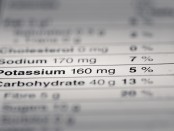Articles by Amy Campbell MS, RD, LDN, CDE
Checking Your Blood Sugar: How the OneTouch Verio Flex Meter Can Help Your diabetes self-management plan should include monitoring your blood glucose (sugar). If you’re not monitoring your blood sugars, or if you’re not sure how to make sense of your readings, here’s how blood glucose [...]
Calcium: Are You Getting Enough?
Calcium is necessary for strong bones, but it also plays other important roles in the body. To be sure you’re getting enough of this vital nutrient, here are the best food sources, and the amount you should eat, to achieve and maintain good health. Are you getting enough of it? [...]
Blood Fats: Taming Your Triglycerides
Your health care provider has probably talked to you about your cholesterol level, and if it’s high, there are many ways to help bring it down. Has he or she also talked with you about your triglyceride level? If so, you might be wondering exactly what this is. [...]
Time for Turmeric!
One of the healthiest spices around is turmeric. If this golden spice isn’t in your cupboard yet, make sure to add it to your shopping list. Not only does turmeric lend color and flavor to curries, stews and rice dishes, it provides a number of health benefits that you won’t want to miss! [...]
Cinnamon for Managing Blood Glucose?
Cinnamon is a delicious and fragrant spice, commonly used in baking pies, muffins and delicious sweet treats like cinnamon rolls. However, did you know that cinnamon may also have health benefits? [...]
Alcohol and Your Diabetes
Summertime is here, and icy cold beer, frosty cocktails and chilled wine are very tempting refreshers. But should you drink alcohol if you have diabetes? And if it’s okay, how much and what type is best? Read on to learn how to safely include adult beverages in a healthy lifestyle. First [...]
Salt Sense: Which Type is Best to Use?
Our recommended daily intake of salt is one teaspoon, or less than 2300 milligrams (mg) of sodium. This comes from the 2015 Dietary Guidelines for Americans. But most people eat much more than 2300 mg. In fact, the average intake is more than 3400 mg per day. Too much sodium raises the risk of high blood pressure, heart disease and stroke. [...]
Vitamin D: Are You Getting Enough?
Vitamin D has become very popular. Reports in the media claim that vitamin D can help with many conditions, such as diabetes, multiple sclerosis and asthma. Yet studies have yet to prove these claims. The reality, however, is that many people don’t get enough vitamin D and might be deficient. [...]
Powerful Potassium
Potassium is an important nutrient that most Americans don’t get enough of on a daily basis. In fact, because most people don’t get enough potassium, it is considered a “nutrient of public health concern.” So learn more about this important nutrient and how you can make sure you get enough [...]
Getting a Handle on your Hunger
If you’re always feeling hungry, you’re not alone. And there are a lot of reasons why. To understand these reasons, it’s important to learn what hunger is and how it’s different from appetite. What is hunger? Hunger is the actual physical need for food. It’s usually accompanied by [...]
Controlling Your Carb Intake
People with diabetes learn that carbohydrate, the nutrient that provides energy for the body, has a big impact on blood sugar levels. Eating too much carb can lead to high blood sugars, while not eating enough carb can lead to low blood sugars (if you take insulin or certain types of diabetes [...]
Healthier Pasta to Eat Now
Pasta has a gotten a bad rap, especially when it comes to managing diabetes. The pasta that most people eat is made with refined flour and contains a high amount of carbohydrate. One serving of pasta, one-third of cup, contains 15 grams of carb. But most people eat more than one-third of a cup! Luckily, thanks to healthier options, you can still enjoy pasta as part of your diabetes eating plan. Just remember to keep an eye on portion size! [...]
Red Foods that Help Your Heart
Did you know that people who have diabetes are twice as likely to get heart disease as people without diabetes? If you have diabetes, there are a lot of steps that you can take to lower your risk. One is to include a variety of healthy foods in your eating plan. And in honor of February’s observances of National Heart Month and Valentine’s Day, why not try some of these red foods? [...]
Managing those Midnight Munchies
Late-night eating might be the norm if you’re a night owl, but it’s important to know that nighttime noshing could be affecting your health. At one time or another, most of us have eaten late or, at least, later than usual. However, falling into the habit of sitting down to a heavy meal or even drinking too much coffee or alcohol late at night can lead to a host of problems. Read on to learn about these health consequences and some tips for managing those midnight munchies. [...]
Fitting Fish into Your Eating Plan
Including fish and seafood in your meal scan lead to a host of health benefits. Fish, especially fatty fish like salmon, tuna and mackerel, contains healthy omega-3 fats, which can lower blood pressure and heart rate, keep the heart beating in a steady rhythm, lower triglycerides (blood fats), and decrease inflammation. Besides containing healthy fat, fish is rich in protein, contains vitamin D, and is low in harmful saturated fat. The American Heart Association recommends eating fish at least twice a week. [...]
©1995-2015 OmniChannel Health Media. All rights reserved.
OmnichannelHealth Media, publisher of CDiabetes.com, does not provide medical advice, diagnosis or treatment. See additional information.















